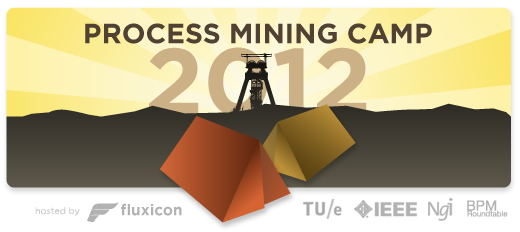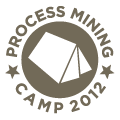As a warm-up for Process Mining Camp, we asked some of the speakers for an up-front interview. Previously, we already spoke with Bram, Frank, and Mieke.
Today, the interview is with Wim Leeuwenkamp, a Strategic Advisor at the Dutch Tax Office.
Wim will share his experiences from a pilot project in the audit department of the Ministry of Finance in the Netherlands. At camp he will share the challenges involved in the construction of event logs in a legacy environment.
Interview with Wim
Anne: Can you still remember where and when you first heard about process mining? What exactly caught your attention and fascinated you about the topic?
Wim: Yes, I remember. A few years ago, in 2009, I worked for the Ministry of Finance, as a senior audit manager. I met an auditor from the Ministry of Infrastructure.
She told me about her experience with a process mining pilot for a purchasing process. At that moment, we decided to start a process mining pilot on a small process within the Tax Department of the Ministry of Finance.
Anne: That’s great. So, you got a chance to do a pilot and see for yourself what process mining can do and what it cannot do. Based on that experience, and based on your auditing background, how does process mining compare to typical auditing and query tools?
Wim: In auditing we normally use query tools for statistical sampling or other selective testing procedures. The traditional method of auditing directs auditors to build conclusions based upon a sample of a population, rather than an examination of all available data. Testing of controls is often done in an old-fashioned way: Selective figure checks, sampling, and a low number of cradle-to-grave testing.
Within the audit department, there is still a lot of buzz around the concept of continuous monitoring and continuous auditing. Although the concept exists a few years now already, there are not many showcases of a successful implementation of continuous monitoring or continuous auditing yet. Maybe the concept in itself is promising, but the IT-infrastructures of most organizations are not mature enough to implement the concept at this moment. There is still the question whether the costs outweigh the benefits.
In the audit department we already used tools to analyze data and do the sampling, mostly related to financial audits. Tools that we use are, for example, ACL, IDEA, and SAS. We also use tools to do some testing of controls in IT-auditing.
The use of statistics in auditing is still a trending topic. As of May 2011 the Steering Group Statistical Auditing writes a monthly column for the Accountant.nl. The Steering Group Statistical Auditing is affiliated with the Limperg Institute and aims “to promote the proper (effective and efficient) use of statistical methods and techniques in auditing and related controls on financial statements and reports”. Besides sampling techniques the emphasis is more and more on analyzing the complete data within the organization.
In my opinion the value added by process mining tools is the easy way to find out a lot of issues related to process flow, including checking totals between process steps, separation of duties within a process, authorization issues, the impact of error queues, and so on.
The costs of gathering all the data and the construction of a log-file should be taken into account. In my opinion the most difficult part of a process mining project is gathering the right data from the information systems within the organization.
Perhaps the “old fashioned” way of sampling is cheaper and also gives the required assurance. The “new kind of auditing” by analyzing the process with a process mining tool gives the auditor a complete view on all the weaknesses in a process. The auditor has more detailed information about the quality of the processing of transactions and can give a better advice to improve processes or organizations.
Anne: Thank you for this interesting round-up of the auditing take on process mining, Wim! We look forward to hearing more about your pilot at camp on 4 June!
Would you like to hear more from Wim about his experiences? Are you interested in sharing first-hand knowledge with fellow process miners? Register now to reserve your seat at Process Mining Camp on 4 June in Eindhoven. Tickets are free, but they are limited, and they are going fast…



